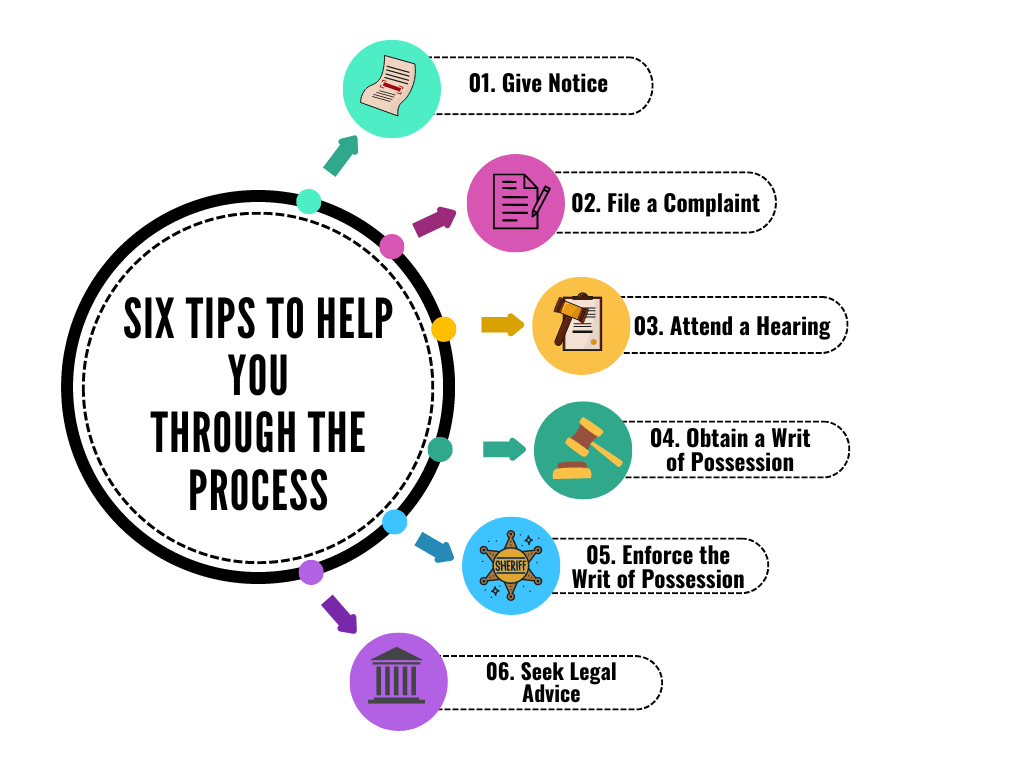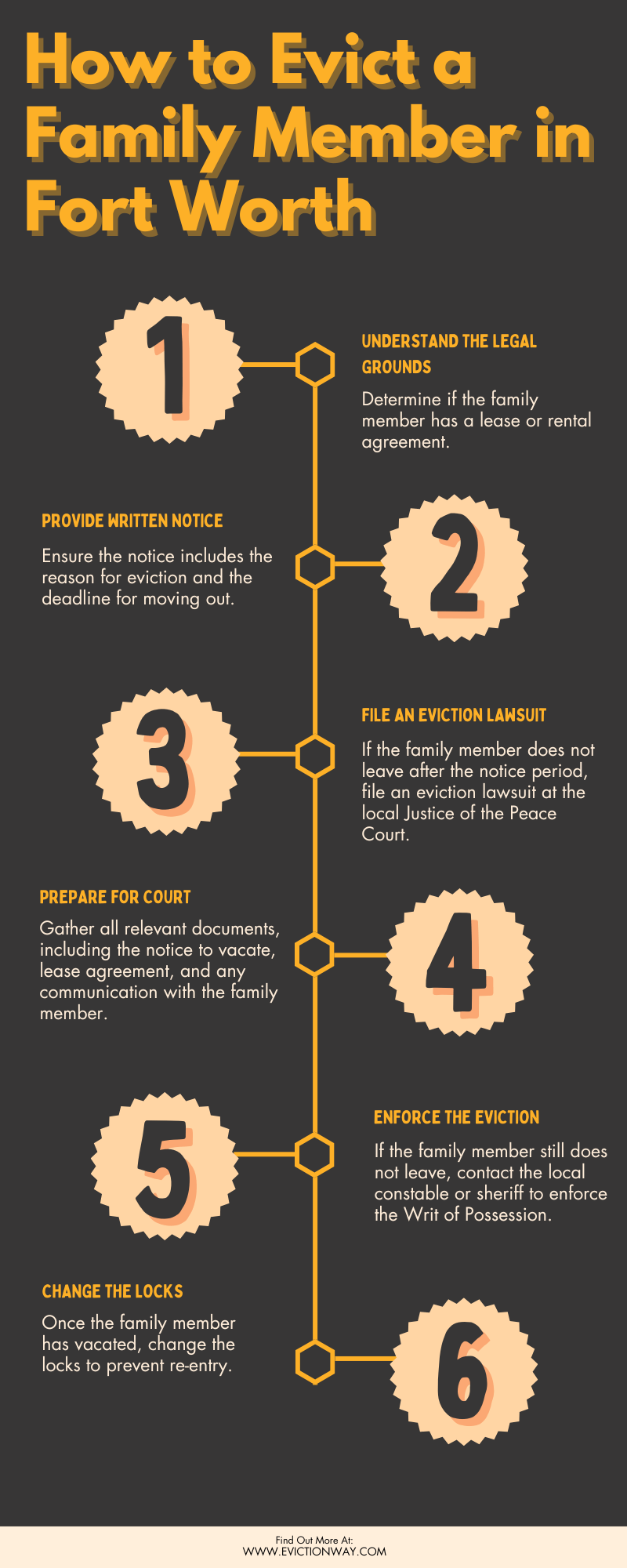Are you facing the difficult situation of needing to evict a family member in Fort Worth? You’re not alone. In this blog, we’ll guide you through the process, providing clear steps and legal insights to help you navigate this challenging time.
We’ll cover the best approach for evicting a family member in Fort Worth, including the legal requirements and procedures. We’ll also share tips on how to handle the situation politely and respectfully, while protecting your rights.
Whether you’re seeking legal guidance or simply want to understand the process, this blog has you covered. We’ll provide valuable information and support to help you navigate the complexities of evicting a family member in Fort Worth.

How To Evict a Family Member In Fort Worth
Evicting a family member can be a difficult and emotional process, but it is sometimes necessary to protect your rights and property. If you are considering evicting a family member in Fort Worth, it is important to understand the legal process and your rights as a landlord.
1. Give Notice
The first step in evicting a family member is to give them written notice to vacate the property. The notice must state the reason for the eviction and the date by which the family member must leave. The notice must be served in person or by certified mail, return receipt requested.
2. File a Complaint
If the family member does not vacate the property by the date specified in the notice, you can file a complaint with the Justice of the Peace Court. The complaint must state the facts of the case and the relief you are seeking, such as possession of the property.
3. Attend a Hearing
Once you have filed a complaint, the court will schedule a hearing. At the hearing, you will have the opportunity to present your case and the family member will have the opportunity to present their defense. The judge will then make a decision based on the evidence presented.
4. Obtain a Writ of Possession
If the judge rules in your favor, you will be issued a writ of possession. This document gives the constable the authority to remove the family member from the property.
5. Enforce the Writ of Possession
The constable will serve the writ of possession on the family member and give them a specific date and time to vacate the property. If the family member does not vacate the property by the specified date and time, the constable will forcibly remove them.
6. Seek Legal Advice
Evicting a family member can be a complex and challenging process. It is important to seek legal advice from an experienced attorney to ensure that your rights are protected.

How Much Does it Cost to Evict a Family Member in Fort Worth?
Evicting a family member can be a difficult and expensive process. The cost of eviction will vary depending on the specific circumstances of the case, but there are some general costs that you can expect to incur.
| Cost | Description | Estimated Range |
|---|---|---|
| Filing Fees | Court fees associated with filing eviction paperwork. | $150 – $200 |
| Attorney Fees | Legal representation throughout the eviction process. | $1,000 – $3,000+ |
| Service Fees | Cost of having someone deliver the eviction notice. | $50 – $100 |
| Late Fees (optional) | Applicable if the family member fails to leave by the court-ordered date. | Varies |
- Filing fees: The first step in the eviction process is to file a complaint with the court. The filing fee for an eviction case in Fort Worth is $150.
- Service of process: Once you have filed your complaint, you will need to have the defendant served with a copy of the complaint and summons. The cost of service of process will vary depending on the method of service.
- Attorney fees: If you hire an attorney to represent you in your eviction case, you will need to pay attorney fees. The cost of attorney fees will vary depending on the complexity of the case and the experience of the attorney.
- Court costs: In addition to the filing fee and service of process, you may also be responsible for other court costs, such as court reporter fees and jury fees.
FAQs: Evicting a Family Member in Fort Worth
Here are some of the most frequently asked questions about evicting a family member in Fort Worth:
What are the legal grounds for evicting a family member in Fort Worth?
In Texas, you can evict a family member if they have violated the terms of their tenancy, such as not paying rent or causing damage to the property. You can also evict a family member if they are engaging in illegal activities or if they are a danger to you or other tenants.
What is the process for evicting a family member in Fort Worth?
The process for evicting a family member in Fort Worth is similar to the process for evicting any other tenant. You must first give the tenant a written notice to vacate. The notice must state the reason for the eviction and the date by which the tenant must vacate the property. If the tenant does not vacate the property by the deadline, you can file an eviction lawsuit with the court.
Can I evict a family member if they are not on the lease?
Yes, you can evict a family member even if they are not on the lease. However, you must be able to prove that the family member is a tenant. This can be done by showing that the family member has been living in the property for a period of time, that they have been paying rent, or that they have been using the property as their primary residence.
What are the consequences of evicting a family member?
Evicting a family member can be a difficult and emotional process. It is important to weigh the pros and cons of eviction before you make a decision. If you do decide to evict a family member, it is important to do so in a legal and respectful manner.
Can I kick someone out of my house without notice in Texas?
Generally, no. Texas law requires landlords to provide tenants with a three-day notice to vacate before eviction, even in cases of lease violations. This gives tenants time to address the issue or vacate the property.
How long does it take to legally evict someone in Texas?
In Texas, the legal eviction process typically takes around 30 days. However, the exact timeframe can vary depending on factors like court schedules and whether the tenant contests the eviction.
Do you need a reason to evict someone in Texas?
Yes. Texas law requires a valid reason to evict someone. This usually involves a breach of the lease agreement, like nonpayment of rent or illegal activity.
Can I get help with evicting a family member?
There are a number of resources available to help you with evicting a family member. You can contact your local legal aid society or tenant’s rights organization. You can also find helpful information online from the Texas Department of Housing and Community Affairs.
Related:
How to Evict a Family Member in Warren
